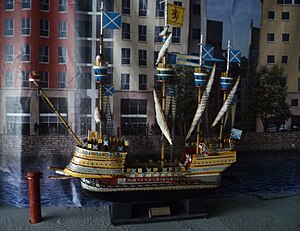Michael (ship)

A model of the Great Michael at Ocean Terminal, Leith
|
|
| History | |
|---|---|
|
|
|
| Namesake: | Archangel Michael |
| Ordered: | c.1505 |
| Builder: | Newhaven dock |
| Laid down: | 1507 |
| Launched: | 12 October 1511 |
| Completed: | 18 February 1512 |
| Nickname(s): | Great Michael |
| General characteristics | |
| Type: | Carrack or great ship |
| Tons burthen: | 1000 |
| Length: | 73.2 m (240 ft) |
| Beam: | 11 m (36 ft) |
| Propulsion: | Sails |
| Complement: | 1,420: 300 sailors, 120 gunners & 1000 marines |
| Armament: |
|
| Notes: |
|
Michael, popularly known as the Great Michael, was a carrack or great ship of the Royal Scottish Navy. She was the largest ship built by King James IV of Scotland as part of his policy of building a strong Scottish navy.
She was ordered around 1505 and laid down in 1507 under the direction of Captain Sir Andrew Wood of Largo and the master shipwright Jacques Terrell, launched on 12 October 1511 and completed on 18 February 1512. She was too large to be built at any existing Scottish dockyard, so was built at the new dock at Newhaven, When Michael was launched she was the largest ship afloat, with twice the original displacement of her English contemporary Mary Rose, which was launched in 1509 and completed in 1510.
The poet William Dunbar wrote of her construction:
.....................carpentaris,
Beildaris of barkis and ballingaris,
Masounis lyand upon the land
And schipwrichtis hewand upone the strand.
Translation:
Carpenters,
Builders of barks and ballingars,
Masons lying upon the land,
And shipwrights hewing upon the strand.
The chronicler Lindsay of Pitscottie wrote of the building of Michael that "all the woods of Fife" went into her construction. Account books add that timbers were purchased from other parts of Scotland, as well as from France and the Baltic Sea. Lindsay gives her dimensions as 240 feet (73 m) long and 35 ft (11 m) in beam. Russell (1922) notes that Michael was supposed to have been built with oak walls 10 ft (3.0 m) thick. She displaced about 1,000 tons, had four masts, carried 24 guns (purchased from Flanders) on the broadside, 1 basilisk forward and 2 aft, and 30 smaller guns (later increased to 36 main guns), and had a crew of 300 sailors, 120 gunners, and up to 1,000 soldiers.
...
Wikipedia
